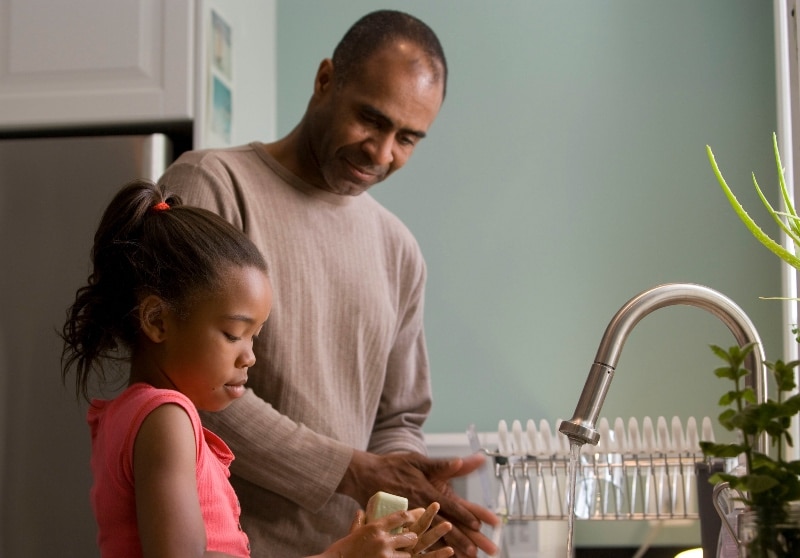Researcher of the Month
The impact of the pandemic on parents and carers
A new paper (published today), which was commissioned by the Scientific Advisory Group for Emergencies (SAGE), appraises what the available evidence tells us about the impact that the pandemic has had on UK parents and carers. It also considers potential interventions to mitigate some of these effects.
Drs Christie and Hiscox review 32 relevant studies to establish what ‘harms’ parents faced, finding that parents and carers were disproportionately affected by the pandemic when compared to the wider population. Evidence showed a rise in mental health problems, financial struggles and an increased risk of domestic violence.
High levels of psychological distress, including anxiety and depression, were consistently identified in the general parent population, especially in parents caring for a child with special educational needs and/or neurodevelopmental disorders (SEN/ND). Existing gender inequalities may have put women at a greater risk of poor mental health and loss of earnings. Further research is needed to establish how long-lasting these ‘harms’ are likely to be.
Summary
The evidence review showed that being female or a single parent, having a lower income, and/or being from an ethnic minority background may have exacerbated psychological distress caused by lockdown restrictions and homeschooling. Parents of preschool aged children seem to have been most severely impacted in terms of parental mental distress. It also revealed high levels of isolation and loneliness among the parent population, which may translate to an increased risk of depression.
Charity reports indicated that many parents, especially those from an ethnic minority background and kinship carers (family members who care for children), were worse off financially and had food insecurities. Mothers were more likely to initiate furlough for themselves compared with fathers or childless women. Domestic abuse support services reported a sharp rise in demand and practitioners reported an increase in child and adolescent violence towards parents.
Evidence strongly links parental mental health and wellbeing with that of children. This report indicates that there is an urgent need for families to receive support to protect children’s long-term development. Brief psychological interventions for parents can be effective in treating depression, anxiety and loneliness. Evidence suggests that child anxiety problems can be prevented through support for parents with anxiety disorders. There needs to be an increasing public awareness around domestic abuse at community, educational and government levels.
Implications
‘Understanding the full extent of the effects incurred by parents and carers during school closures is vital to identifying and supporting vulnerable families, as well as mitigating harmful consequences to themselves and their children, and to their children’s education and long-term prospects’.
Implications for parents – Pay attention to your own mental health. Parental mental health is highly correlated with children’s mental health, so parents need to take their own feelings and experiences seriously. Seek help if you think you might be suffering from depression, anxiety or loneliness. The report highlights brief psychological interventions and peer support as potentially helpful mitigations and advises that apps and online therapies should be investigated, as they are easily accessible. Poor mental health in lockdown was associated with lack of physical exercise. Consider your activity levels and how increasing them could help.
Implications for schools – Schools should use this new research to explore what interventions could work and for the resources that it cites. The report highlights that teachers need more training to be able to identify signs of trauma or domestic abuse in both children and their parents. Pathways for exploring domestic-abuse and help-seeking need to be clear in all school settings. Teachers may need help with exploratory questions to help them talk about this sensitive subject with pupils. Schools might find the Violence, Abuse and Mental Health Network’s resource, Safe, Seen, Supported useful.
Listen to our podcast interview with Dr Christie and Dr Hiscox to learn more.
Resources Created from and Related to this Research

Dr Hope Christie, University of Edinburgh and Dr Lucy Hiscox, University of Bath.
Dr Christie specialises in the impact of trauma exposure and post-traumatic stress disorder in parents and how this may affect parenting and the family dynamic. Her role is cross-cultural, working with parents in both the United Kingdom and South Africa. Dr Christie’s current research focuses on understanding more about the psychological support services that are offered to parents and carers following trauma in South Africa.
Dr Hiscox’s expertise lies in brain imaging with MRI and investigating the relationship between brain structure and function. She is currently investigating the impact of trauma exposure incurred by mothers during pregnancy and the consequences for infant’s brain health and long-term development.






